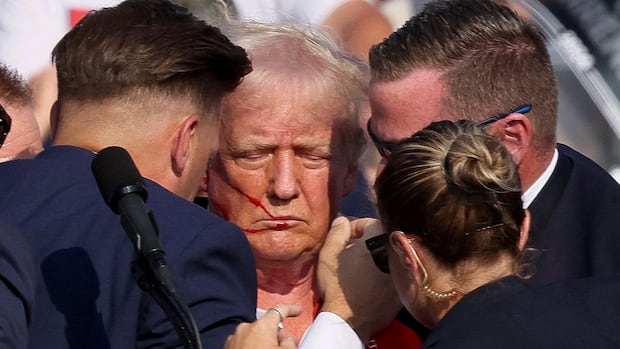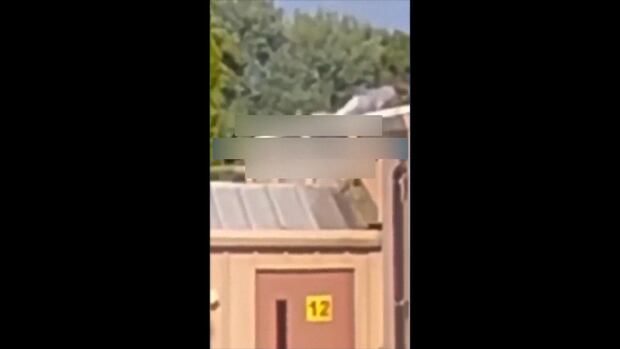U.S. Secret Service defends response to Trump assassination attempt amid heavy criticism
Biden has ordered review into how gunman came so close to killing former president
The U.S. Secret Service, which is responsible for protecting presidents and former presidents, went on the defensive on Monday against criticism of its failure to detect the gunman whose shots wounded Donald Trump in his right ear at a campaign rally on Saturday and killed a spectator.
"Secret Service personnel on the ground moved quickly during the incident, with our counter sniper team neutralizing the shooter and our agents implementing protective measures to ensure the safety of former president Donald Trump," Kimberly Cheatle, the agency's director, said in a statement.
U.S. President Joe Biden ordered an independent review of how Thomas Matthew Crooks, the suspect who was shot dead by agents moments after opening fire, could have come so close to killing or severely wounding the Republican presidential candidate despite the heavy security provided by the Secret Service at Saturday's event in Butler, Pa.
On Saturday afternoon, Crooks was able to slip onto a rooftop location 140 metres from the stage where Trump was speaking. He then began firing an AR-15-style semi-automatic rifle, purchased by his father, officials said.
The gunfire killed a 50-year-old man, critically wounded two other spectators and struck Trump's ear.
Officials said "a suspicious device" was found in the suspect's vehicle, which was inspected by bomb technicians and rendered safe.
The FBI has taken the lead in an investigation of the shooting. Kevin Rojek, the FBI special agent in charge, said it was "surprising" that the gunman was able to fire at the stage before he was killed.
U.S. Rep. Mark Green, a Tennessee Republican who chairs the House committee on homeland security, sent a letter to Homeland Security Secretary Alejandro Mayorkas on Sunday raising questions about the shooting and demanding information about the former president's Secret Service protection.
"The seriousness of this security failure and chilling moment in our nation's history cannot be understated," Green wrote.

Green also noted reports that the Secret Service had rebuffed requests from the Trump campaign for additional security.
A spokesperson for the Secret Service, Anthony Guglielmi, posted on X, formerly Twitter, on Sunday that those allegations were "absolutely false" and that resources and technology were added as the campaign's travel increased.
'How did that happen?' ex-agents ask
Brian Gant, a former Secret Service agent, told CBC News that the burden of the job is to be perfect, and he described the shooting as an agent's "worst nightmare."
"I believe the investigation will yield just what the [security] plans were ... and how the shooter actually got access to that area," Gant said.
Other former top Secret Service agents say that Crooks should never have been allowed to gain access to the roof and that the agency will have to figure out how that happened. They said such a lapse could have been caused by officers neglecting their posts or a flaw in the event's security plan.
"I have no doubt that agents ... are looking back and re-assessing everything that they did to make sure they did what was correct," Cheryl Tyler, the first Black female Secret Service agent, told CBC News.
Stephen Colo, a retired assistant director at the Secret Service, told The Associated Press that presidential candidates and former presidents don't typically get the same level of protection as the sitting president.
In fact, Colo said, he was surprised that the agency had staffed the event with a counter sniper team. Such a valuable resource — there are not many of those highly trained agents — is usually reserved for the president. Candidates don't usually get such teams.

Timothy McCarthy, a former agent who retired from the agency in 1994, told The Associated Press that the Secret Service "better be doing a deep dive into what happened there and doing whatever it takes to figure it out" because the gunman should not have been able to occupy such a vantage point.
"How did that person get up on that building?" said McCarthy, 75, who in 1981 took a bullet when then-president Ronald Reagan was shot outside the Washington Hilton Hotel.
"How did that happen? I mean, that's the key to the entire thing. And what measures were put in place to prevent it?"
Tyler echoed McCarthy's sentiment but noted that a massive overhaul of the Secret Service is not likely to happen — at least not publicly.
"Once you're trained to think and respond the way a Secret Service agent does, it never leaves you. You do not do knee-jerk reactions, and that is something that the agency is not going to do," Tyler said.
"They will question, they will what-if themselves to figure out what needs to be done if something is to be done. How that goes about, how any changes occur, that won't be something that's written on the front page of the newspaper."
With files from The Associated Press and CBC News



